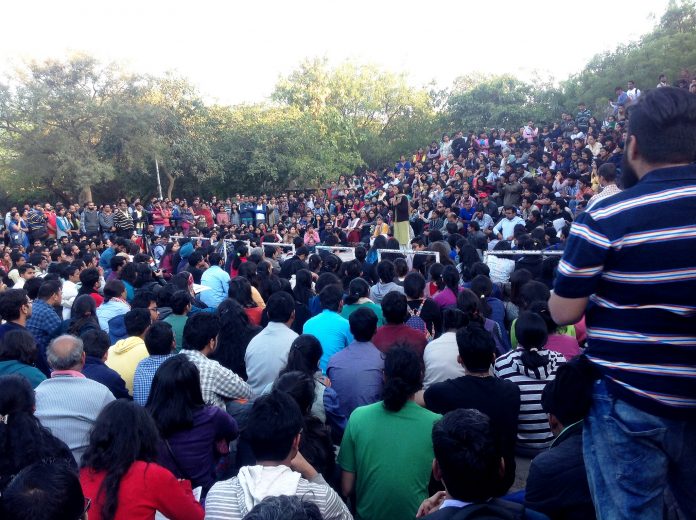By Umar Nizar for Twocircles.net
The Jawaharlal Nehru University in New Delhi is a site of great symbolic violence, though it might appear peaceful to the casual observer. JNU once again is in the eye of a storm, and the administration block has been under siege. The unilateral imposition of a UGC notification (dated May 5, 2016) has led to the prospect of massive seat cuts in almost all the centres. The notification stipulates that “A Research Supervisor/Co-supervisor who is a Professor, at any given point of time, cannot guide more than three (3) M.Phil. and Eight (8) Ph.D. scholars. An Associate Professor as Research Supervisor can guide up to a maximum of two (2) M.Phil. and six (6) Ph.D. scholars and an Assistant Professor as Research Supervisor can guide up to a maximum of one (1) M.Phil. and four (4) Ph.D. scholars.’’
As a result of this horrible mix-up between physical and intellectual labour, chaos looms over the campus and its students. In the School of Languages for instance, in the Arabic and African studies Centre, no students will be admitted this year, whereas 31 students were admitted in 2016. In the Centre for Indian Languages, there will be no new admissions as per the new guidelines. The centre had an intake of 60 students last year. The same applies for most other centres. Also envisaged is a delinking of M.phil courses from Ph.D. which would mean that the M.Phil scholars will have to sit through another entrance test. The entrance exam is to be made qualifying in nature and admissions will be solely reliant on the non-transparent Viva Voce process.
While the JNUSU (Jawaharlal Nehru University Students Union) has become a spent force after repeated assaults starting from February last year, most of the students on the campus are confused and disillusioned over what has been unravelling. Where is the rationale behind this new slew of proposals intended to reform the university? Why should the entrance exam which is the basis of JNU’s inclusive nature, be relegated to virtual insignificance? It seems that a need for greater immediacy has been felt at the higher echelons of policy making. The entrance examination was a major cog that decentralised the admission process so that too much power did not rest on any one entity. But alas, the ruling deities have made a one-size-fits-all formulation. The students and research scholars are to them as `flies are to wanton boys.’
At the heart of the issue is a conflict of rights. Whose campus is it? Does it belong to the thick-skinned John Lennon wannabes-the connoisseurs of second-hand cars, the urban and mofussil bourgeois with varying levels of access to institutional power- or to those who hang out in the library or even the foyers of the convention centre and survive on watery dal? This conflict is a microcosm of the wider contestation going on regarding `who owns the Nation?’ The corporate houses and media, the bourgeois public, the toiling masses, the contesting subalterns are all part of this struggle to appropriate the nation and call it as their own. There is immense symbolic violence imbued within this smouldering contest between two sorts of histories. Pierre Bourdieu calls symbolic violence “the violence which is exercised upon a social agent with his or her complicity” (Bourdieu, 2002). This is based not on coercion, but rather on consent generation. This could be on gender, caste, regional or other grounds. Already existing predispositions and tastes in terms of pedagogy and camaraderie and conjugality and even nationality, clash with other inchoate, folk identities.
JNU, pretensions notwithstanding, is not an elitist campus. But it is also is home to much symbolic violence. The disappearance of Najeeb Ahmed who has been missing from the campus since October 15, 2016, is a case in point. JNU being a residential campus, the hostels are the smithies where the soul of this university is forged. It is not the individual schools but the hostels that make or break the students.
“Every expression is a kind of symbolic violence which cannot be exerted by the person who exerts it and cannot be undergone by the person who undergoes it, except in so far as it is misrecognized as such. And if it is misrecognized as such, that is partly because it is mediated through a process of euphemization‘’ (Bourdieu, 1993). This is encapsulated in the insistence of most JNU students to call a spade a spade and to reject proposals that would project turd world formulae as golden ratios for the future. The intention of the new guidelines is to neuter a stance that speaks truth to power. They want to fossilize JNU into an effective space of clichéd activism-i.e. into a museum for select specimens.
Umar Nizar is a researcher at SLL& CS, JNU. His book `Staging Sakuntalam in Colonial Travancore-Essays on the Literary Subaltern’ was published last year.

